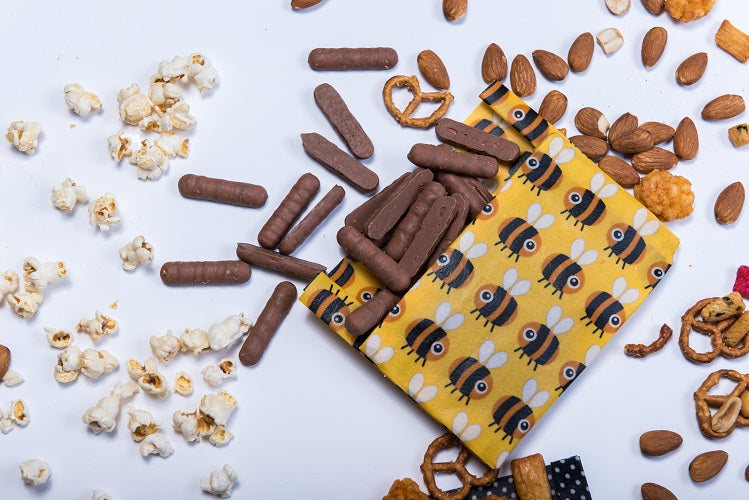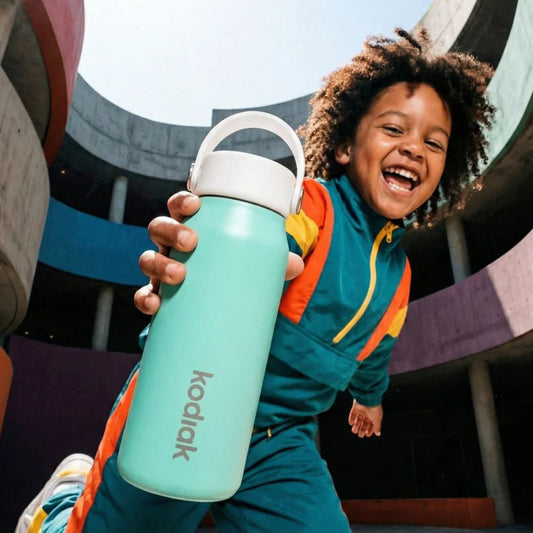 First published in August 2017. Last updated in July 2025.
First published in August 2017. Last updated in July 2025.
One of the biggest culprits in landfill-bound rubbish is the petroleum plastic used to package and store our food—cling wrap, plastic containers, snap-lock bags, plastic trays. Plastic that is touching our food, leeching toxins and microplastics that are not good for us nor the environment.
Swapping to a natural wax wrap is one of the easiest ways to cut that plastic and feel good about every fridge shelf and school lunchbox.
At Biome, we’ve offered reusable wax wraps for two decades!! We have always supported locally handmade with natural fibres and ethical ingredients. They are endlessly versatile to wrap sandwiches, cover bowls, protect half-cut fruit, or fold into snack pockets. And when they wear out, they go back to the earth.
But a question we often hear is:
What’s the difference between beeswax and vegan wax wraps?
The answer is simple.
It's all in the wax
Both wrap types are made from natural cotton infused with a blend of tree resin, jojoba oil and sometimes coconut oil—that’s what gives them their stickiness and antibacterial properties. The only difference?
🐝 Beeswax wraps use Australian beeswax
🌱 Vegan wraps use candelilla wax
Same fabric, same function. Just a different wax base.
So which one works better?
If you're choosing purely on performance, we’ll be honest—beeswax wins. In our experience (and many others online), a good quality beeswax wrap is:
- Stickier, making it easier to seal tightly over bowls and food
- More pliable, especially when warmed with your hands
- More smooth and less prone to cracking over time
- Longer lasting, often holding up for over a year with good care
Candelilla wax wraps are firmer, which can make them feel stiffer and a bit more prone to brittleness, especially in cooler climates. They’re still a great low-waste choice, but don’t quite match the reliability and comfort of beeswax for everyday use.
A win for bees and the planet
We’re proud to say that the beeswax used by our wrap makers is sourced only from ethical Australian beekeepers. These small-scale beekeepers focus on hive health, biodiversity, and sustainability. Supporting them not only gives you a superior product, it helps maintain strong, healthy bee populations in Australia.
Bees are vital pollinators—without them, we don’t have most of the fruits, nuts, and veggies we eat.
However, we agree that harvesting beeswax can harm bees and disrupt their natural cycles, so it is understandable that some people choose to use no bee-derived products.
Vegan is still a great choice
If you’re vegan, allergic to bee products, or simply prefer a plant-only option, our vegan wax wraps are still a fantastic alternative to cling wrap. They’re:
- Cruelty-free and animal-derived ingredient free
- Made from candelilla wax, a renewable plant resource
- Unscented, flexible, and handmade in Australia
- Compostable at end of life
- Refreshable, just like beeswax wraps. Refreshed by grating a refresher block onto the fabric wrap, and melting with iron between parchment paper.
With good care, they’ll serve you well for months. They just need a gentler hand and a bit more warmth to mould effectively.
Quality Matters
Just like with any kitchen tool or gadget, not all wax wraps are created equal.
It’s easy to assume all beeswax or vegan wraps are the same, but there’s a huge difference between a cheap, mass-produced wrap made in China and available on Temu, Amazon or Alibaba with questionable ingredients—and a high-quality, lovingly handmade version using certified organic cotton, pure Australian beeswax, or food-safe plant waxes. The wraps we choose to stock at Biome are by trusted boutique makers.
You’ll feel the difference the moment you open the pack—and you’ll see it in how well they perform over time.
Wrap up
If you're choosing between vegan and beeswax wraps, both wraps cut waste, support local makers, and help you live with less plastic waste. Both are useful for Brisbane lunches, Perth picnics, and Sydney leftovers!
But if you want the most durable, easy-to-use option, we suggest beeswax.
Note: Whichever wrap you pick, we recommend hand-washing in cool water with mild soap, air-drying, and refreshing wraps when they look tired. Both wraps last 6–12 months with proper care. ⭐
Related reading
How to Refresh a Beeswax or Vegan Wax Wrap
How Long Do Beeswax Wraps Last?
































